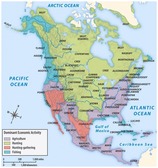Description
- Overview:
- What Europeans called “the New World” had people living there that had been there for thousands of years. Great civilizations had risen, large population centers had come and gone, and the people we know today as Native Americans or First Americans spoke many languages, had trade routes, treaties, and a variety of religions. Africa, or more specifically, West Africa, also had great kingdoms, trade routes, and a large variety of languages, religions, and traditions. Many West Africans had already encountered European and Middle Eastern peoples through trade along the sea ports and across the Mediterranean. As religious and social turmoil changed the European landscape, new inventions like the caravel, astrolabe and compass allowed for easier and safer sea travel. Spain and Portugal led the search for an easier route to the Far East and discovered the New World. They were quickly followed by the French and British. Soon the Columbian Exchange would bring changes to the New World that no one could have expected, or predicted.
- Subject:
- U.S. History
- Material Type:
- Module
- Provider:
- Ohio Open Ed Collaborative
- Date Added:
- 05/15/2019
- License:
-
Creative Commons Attribution Non-Commercial

- Language:
- English
- Media Format:
- eBook, Text/HTML
Standards
Evaluations
No evaluations yet.


Comments